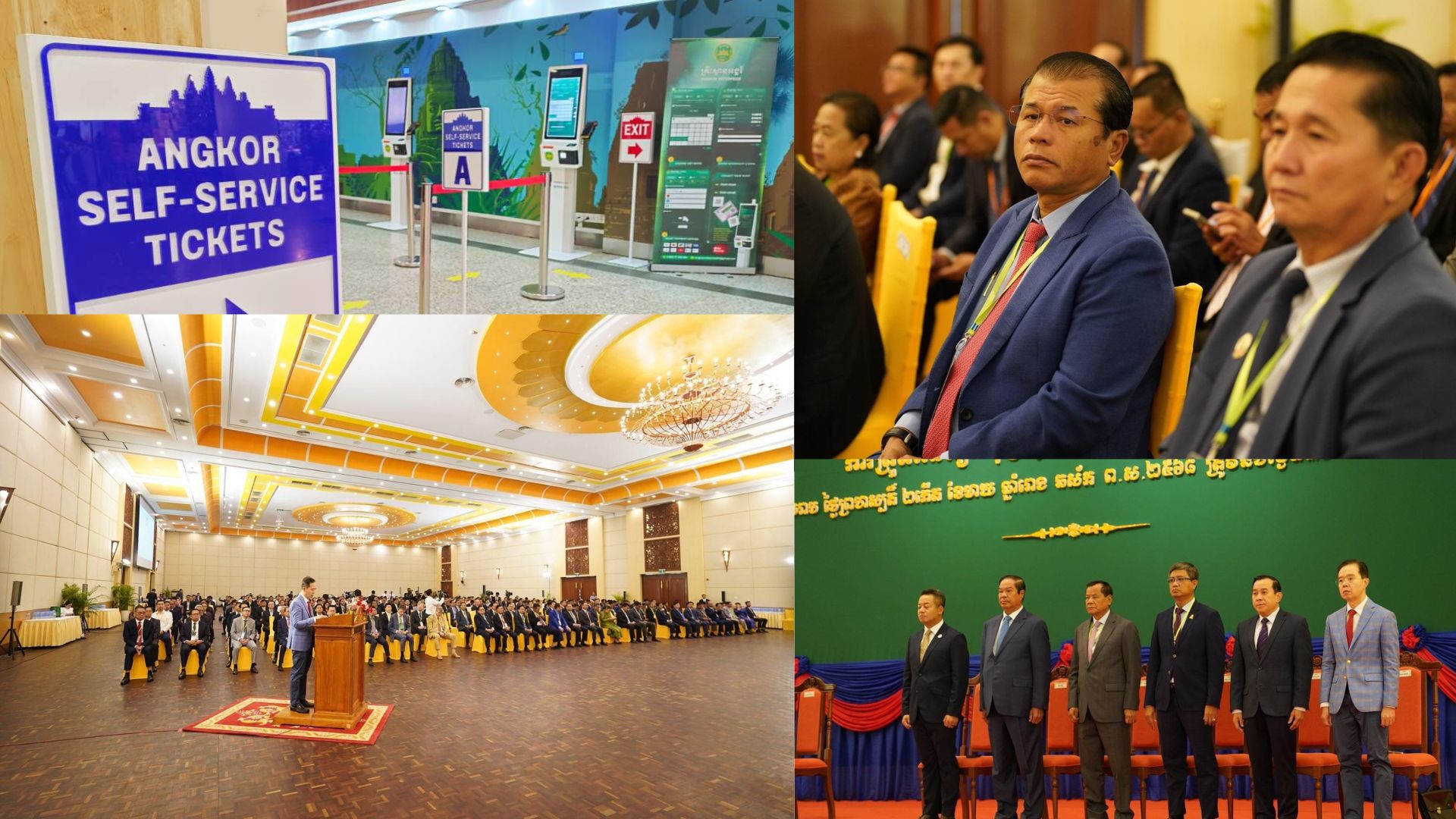
(Siem Reap): On the morning of Wednesday, January 30, 2025, the Royal Government of Cambodia officially launched a new ticketing and inspection system for Angkor archaeological site visits. This system is designed to streamline operations and eliminate complexity for tourists.
The implementation of this digital ticketing system marks a significant step in modernizing ticket sales and management for Angkor and other related tourism sites. Managed under the authority of Angkor Institution, this initiative aligns with the government’s efforts to enhance services for international tourists, boost tourism attraction, and contribute to national economic growth.
The inauguration ceremony was presided over by Deputy Prime Minister Net Savoeun, representing Prime Minister Hun Manet, with participation from government officials, including deputy prime ministers, ministers, provincial governors, and tourism sector representatives.
The Royal Government recognizes tourism as a "green gold" industry, playing a crucial role in economic growth, job creation, and cultural heritage promotion. The sector has witnessed rapid expansion through the adoption of modern technology, particularly digital innovations, which are crucial for managing and revitalizing the tourism industry post-COVID-19.
Angkor, a world-renowned cultural and historical tourist site, attracted over two million international visitors annually before the COVID-19 pandemic. To manage and optimize revenue collection from ticket sales, the Royal Government established the Angkor Institution on January 21, 2016. This public administrative institution was assigned financial oversight by the Ministry of Economy and Finance and technical supervision by the Ministry of Tourism.
As a non-tax revenue entity, Angkor Institution developed an advanced information technology system for ticket sales management, first launched in late 2016. This initiative improved service efficiency and transparency in revenue collection. By 2017, the institution introduced electronic payment options, allowing tourists to pay via credit or debit cards instead of cash transactions.
To further enhance transparency and accountability, real-time ticket sales data were made publicly available on the institution’s website in 2018. Recognizing the increasing demand for convenience, an online ticketing system was launched in 2019, enabling tourists to purchase tickets from anywhere without queuing at physical ticket counters.
Despite these advancements, certain challenges remained. The need for further reforms in ticket sales, data collection, and ticket verification procedures led Angkor Institution to collaborate with the Economic and Digital Business Commission, with technical support from ABA Bank, to conduct a comprehensive study. The study aimed to refine operations, eliminate unnecessary personal data collection, and enhance efficiency.
Following extensive research and consultation with private sector stakeholders, the reform plan was successfully implemented, leading to the official launch of the new ticketing and inspection system.
During the ceremony, Deputy Prime Minister Net Savoeun commended the Ministry of Economy and Finance, the Ministry of Tourism, the Siem Reap Provincial Administration, and all stakeholders for their continuous efforts in restoring and advancing Cambodia’s tourism sector. He also praised the leadership and staff of Angkor Institution for their dedication in achieving this milestone.
The new system integrates advanced technology, including self-service ticketing machines, online sales, and a mobile app available on Google and Apple stores, making ticket purchases more accessible and efficient. These enhancements also contribute to strengthening government revenue collection.
Notably, the system upgrade has allowed Angkor Institution to optimize ticket verification using modern devices, ensuring seamless inspections at all temple sites, even in areas with limited internet connectivity. This reform eliminates redundant checkpoints, minimizing inconvenience for international visitors.
To further facilitate ticket purchases, Angkor Institution has deployed 15 self-service ticketing machines across three key locations:
- Angkor Institution Ticket Office (6 machines)
- Angkor Pavilion (6 machines)
- Heritage Walk Mall (3 machines)
Additionally, the online ticketing system has been upgraded, enabling tourists and travel agents to purchase tickets via the official website (www.angkorenterprise.gov.kh) and the mobile app.With these developments, international tourists and tour operators can now buy tickets through four channels:
- Online via the official website
- Mobile app
- Self-service machines
- Physical ticket counters
This transformation has significantly improved accessibility and convenience for visitors and tourism operators alike.
According to Angkor Institution’s 2024 report, over 1.2 million international tourists purchased Angkor site tickets, reflecting a 28.3% increase from 2023. Ticket sales generated nearly $48 million in revenue, a 28.6% rise compared to the previous year. Additionally, Koh Ker temple ticket sales contributed $329,000, a 48% increase from 2023, while Tonlé Sap boat tour ticket sales at Chong Kneas brought in $1.43 million, a 38% increase, with $620,000 allocated to local boat associations.
Overall, in 2024, Angkor Institution generated nearly $50 million in revenue, including $2.04 million in contributions to the Kantha Bopha Foundation.



